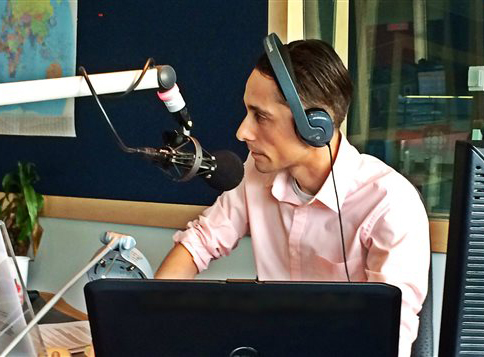

What have you been working on since graduating from j-school?
I graduated in 2008 – it was a few months before the financial crisis hit the media industry. The future in the field looked uncertain for many of us (it still does, actually), but I didn’t mind: I wasn’t attached to the idea of having a permanent of a “safe” job. I just wanted to tell good stories.
A mandatory class that we had to take at the time was multiplatform journalism with Alfred Hermida. It was the first time it was taught at the school, I’m not sure I would have taken it had it been an elective, but it is what I have been doing since graduating.
After graduating I stayed in Vancouver, mostly working in radio for Radio-Canada and writing for magazines in Quebec. With the Olympics coming, I blogged and wrote for L’Actualité (the French equivalent to Maclean’s) and worked on several projects on radio and television for Radio-Canada that were to be broadcast during the games.
In the years that followed, my work as a freelancer was varied and eclectic: including research and field producing for Radio-Canada, Historia, and French-based Arte in China, the USA and Canada; writing for L’Actualité, Québec-Science, Commerce/Les Affaires and The Tyee; producing radio stories for Dimanche Magazine (the equivalent to the Sunday Edition on Radio-Canada) and Dispatches on CBC; working on a documentary/webdoc called « Où vas-tu Vancouver ? » about the changing face Vancouver for Radio-Canada, etc.
What’s been the piece of journalism you’ve produced of which you’re most proud?
Across platforms, a common theme has been social issues or the social impact of certain issues. I developed my own specialty as a journalist and as a producer who can easily switch from one platform to the other. To give you a few more examples, in 2009, I went to the Balkans to report on the lasting tensions in Bosnia following the war and the challenges of Kosovo following its independence. The project was self-financed. And through my skills in multiple formats in both English and French, I managed to develop stories that I wouldn’t have been able to develop otherwise. In 2012, I worked on a series on baby boomers and their retirement. The project, for television, radio and the web, started a discussion about the challenges of having an aging of its population. I’m particularly proud of this project because even though the stories for radio and television were based on the same material, they had a distinct feel and personality.
How did your j-school experience help you transition into a career in journalism?
I don’t think I could ever have done those projects without the skills I learned at the SOJ. The mentorship from professors like Kathryn Gretsinger, David Beers and Peter Klein helped me define what kind of stories I wanted to tell, how I wanted to produce them and most of all, what kind of journalist I wanted to be.
What advice would you give to aspiring journalists?
Ask yourself questions. Lots of questions. Beyond the degree, what are you seeking from this program? Why are you there? What are your goals? There are many kinds of jobs in the field. Landing a job in the mainstream media shortly after graduation might not happen, but there are many surprising opportunities if you’re willing to think outside of the box. And lastly, be an entrepreneur – I believe the best assignments are those you create yourself.
Photo Credit: Ici Radio Canada Premiere


